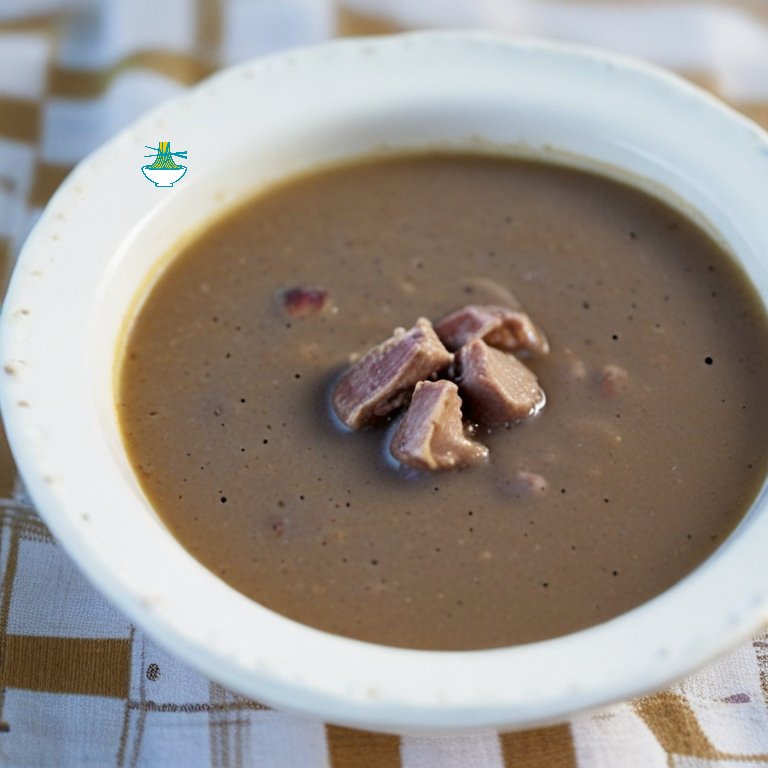Chikwanga is a traditional dish originating from the Democratic Republic of Congo. It is made from fermented maize meal, giving it a unique and slightly tangy flavor. The dish has a dense, pudding-like texture and is often enjoyed as a snack or side dish in Congolese cuisine. It holds cultural significance as a staple food in many Congolese households, showcasing the use of locally available ingredients and traditional cooking methods.
Ingredients:
- 2 cups fermented maize meal
- 1 cup coconut milk
- 1/2 cup sugar (adjust to taste)
- 1/4 teaspoon salt
- Banana leaves (for wrapping, optional)

Method of Preparation:
1. In a bowl, combine the fermented maize meal, coconut milk, sugar, and salt. Mix well until you get a smooth batter-like consistency.
2. If using banana leaves, cut them into square pieces and lightly heat them to make them pliable.
3. Place a portion of the batter onto a piece of banana leaf and fold the leaf to form a packet.
4. Repeat the process until all the batter is used up.
5. Steam the wrapped Chikwanga packets for about 1 hour until firm.
6. Remove from the steamer and let them cool slightly before unwrapping and serving.
Nutrition Value:
1. Fermented maize meal (2 cups):
- Calories: Approximately 400 calories
- Carbohydrates: About 80 grams
- Protein: Around 8 grams
- Fat: Approximately 4 grams
- Sodium: Minimal, typically less than 10 mg
- Cholesterol: None
- Vitamins and Minerals: Provides B vitamins, including niacin and thiamine, as well as iron and magnesium.
- Nutritional Benefits: High in carbohydrates for energy, contains some protein and essential nutrients like iron and B vitamins.
2. Coconut milk (1 cup):
- Calories: Around 450 calories
- Carbohydrates: Approximately 6 grams
- Protein: About 4 grams
- Fat: Approximately 48 grams, mainly saturated fat
- Sodium: Varies based on brand, typically less than 20 mg
- Cholesterol: None
- Vitamins and Minerals: Contains vitamin C, E, B vitamins, iron, and potassium.
- Nutritional Benefits: Rich in healthy fats, provides some protein, and offers essential vitamins and minerals.
3. Sugar (1/2 cup, adjust to taste):
- Calories: About 400 calories
- Carbohydrates: Approximately 100 grams (all sugars)
- Protein: None
- Fat: None
- Sodium: Negligible
- Cholesterol: None
- Vitamins and Minerals: No significant vitamins or minerals.
- Nutritional Benefits: Provides quick energy due to its high sugar content but should be consumed in moderation.
4. Salt (1/4 teaspoon):
- Calories: None
- Carbohydrates: None
- Protein: None
- Fat: None
- Sodium: Approximately 590 mg
- Cholesterol: None
- Vitamins and Minerals: No significant vitamins or minerals.
- Nutritional Benefits: Adds flavor but should be used sparingly due to its sodium content.
5. Banana leaves (for wrapping, optional):
- Calories: Negligible (used for wrapping and not typically consumed)
- Carbohydrates: Minimal
- Protein: None
- Fat: None
- Sodium: None
- Cholesterol: None
- Vitamins and Minerals: Contains small amounts of vitamins A and C.
- Nutritional Benefits: Adds a natural aroma and flavor to dishes but is not a significant source of nutrients as it's mainly used as packaging in this recipe.


Comments